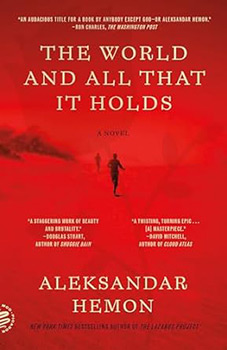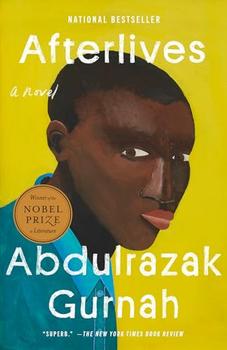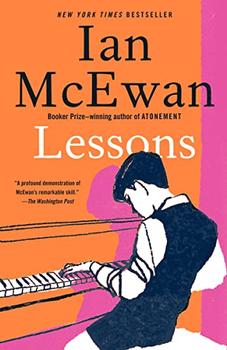Summary | Excerpt | Reviews | Beyond the book | Read-Alikes | Genres & Themes | Author Bio

A Novel
by Aleksandar HemonAleksandar Hemon's characters are romantics. We know this not only because they write love songs and poetry, quote Shakespeare or eke out meager livings as writers, but because whenever they meet a woman or man whom they obviously want to sleep with, they don't describe any body parts between the shoulders and the knees. At first glance, the Hemon character might latch onto a "pointed tongue of hair," "a lean neck… and the gentle twirl of her pate," dimples, asymmetrical eyebrows, dark eyebrow dashes, a reluctant smile, frail ankles, "lively black eyes," "sea-green eyes," "sparkling eyes" or eyes that have a "melancholy, consumptive sheen." He's not just horny—he's deep.
This affection is usually not returned, but no matter. Hemon understands what Emerson wrote, which is that love transcends the unworthy object, that the lover is enlarged by their feelings whether or not they're reciprocated. In fiction-writing terms, he understands that a depiction of love reveals more about the lover than the love-object. Unrequited longing—sometimes for a person, dead or indifferent; sometimes for a home that no longer exists; often for both at once—is Hemon's primary mode of character study.
Rafael Pinto, Hemon's latest creation, is perhaps his most romantic and longing character to date. At the beginning of The World and All That It Holds, Pinto is a begrudging but good-humored pharmacist in 1914 Sarajevo; to cope with his boredom, he takes laudanum, an opiate, writes poetry in multiple languages, and loses himself in erotic (if pretty chaste) fantasies. When the Archduke Franz Ferdinand comes to town, Pinto even makes a move on a military officer who patronizes his shop. "What is in your heart about your fellow man is likely to be in his heart about you," he tells himself, before kissing the stranger. Good for him! The officer doesn't reciprocate, but Pinto follows him into the parade anyway, close to the Archduke, where he has a front-row seat to the beginning of the end of the world.
Pinto is soon conscripted into the Austro-Hungarian army to fight in World War I, where he meets Osman, also a soldier, and their lives intertwine. Osman is charismatic, hairy, brave, a master storyteller, Pinto's lover and protector. Miraculously, they survive a Russian attack that kills everyone else in their company, but are soon captured by Russians and taken to a prison in Tashkent (the capital of modern-day Uzbekistan). They do get out of prison (the details are pleasurably foggy; I won't go into them) but are then stuck in Tashkent. Osman devises a plan to get them back to Sarajevo, which involves Bolsheviks and a British spy named Moser. (This is all in the first third of the book; there's a lot more history to come.)
The narrative is slightly hard to follow, due to some jumping around in time, the jumble of languages being spoken and Pinto's opiate hazes. And there's also something playfully uneven about the tone; a scene of tension and violence will give way abruptly to an excerpt from Moser's fabular autobiographies or to a few jaunty, research-packed paragraphs about an American spy or a murderous baron. "Let this be the beginning of a beautiful friendship," Moser tells Osman, in German, 20 years before it could plausibly be a Casablanca reference (although only a reader who speaks German or opens Google Translate will pick up on the anachronism). In other words, Hemon is having fun with it, and he's not confining himself to one narrative mode. This is mostly enjoyable, sometimes a little grating and probably necessary in a 300-page novel that is mostly about war, violence and the difficulty of survival. Still, I was most absorbed during the long stretches spent with Pinto's ragged body and mind, without the clever interruptions.
The relationship between Pinto and Osman, though mutually affectionate and consummated, has that familiar sheen of unrequited love. There's something just out of reach about Osman. He's mysterious, and has to hide most details of his espionage work; he loves Pinto but still openly imagines a future in which he lives a more traditional life, with a wife and daughter. For hundreds of pages, Pinto's life consists mainly of longing for Osman and trying not to die—homeless and paperless, he walks to Shanghai, barely surviving, never settled, Osman's voice in his head instructing him to stay on his feet and duck from stray bullets. He runs intermittently into Moser, who saves and changes his life a few times. If Pinto is Hemon's latest "Nowhere Man"—the title of his debut novel—then Moser is an "Everywhere Man"—also wandering, never settling, narrowly escaping danger, but by choice. What makes the Everywhere Man different from the Nowhere Man? Confidence, and a British passport. Pinto's continued survival starts to seem like an oversight by God; it's as if he's slipped through the cracks of history while also being undoubtedly shaped by it. "The Lord has nothing to do with any of this," he says. "Although, to be fair, all of this is His doing."
The World and All That It Holds is Hemon's best novel, I think. It combines his interests—war and displacement; fables and storytelling; making sense of history; Sarajevo; espionage in East Asia—into a coherent, emotionally consistent narrative, unlike the incongruent chapters of Nowhere Man or the cynical, affected parallels of The Lazarus Project. And his prose is more freewheeling here: the repetitious phrases, the medley of languages, Pinto's attempts at religious poetry, the drug- or fever- or starvation-induced haziness—there's a kind of uncontrolled momentum. Hemon's other fiction tries too hard to be witty—to strike the perfect simile, or to shine a spotlight on some clarifying image. Here, there are no spotlights.
Still, Hemon will never fully cede control; he wants the reader to see how he's pulling the strings. In this book, those strings take the form of a metafictional narrator, unnamed but distinctly Hemon-like, who appears frequently on the page to remind us that Pinto and Osman and Moser are all "real" people whose lives he has uncovered in his historical research. I didn't mind this layer—I think it allows Hemon to be more inventive and capacious in his storytelling, and the sometimes-grating playfulness is an acceptable price to pay for that—until I got to the baffling, superfluous epilogue, in which the narrator meets one of the "real" characters, hears her life story, and debates writing about it. As origin stories go, fictional or not, it's uncompelling. Luckily, it's easy to compartmentalize. What sticks with the reader when she closes the book is not the insecure, wavering "writer," but his heroic, desperate creations, battered by sandstorms as they walk across the desert, or hidden from Bolsheviks behind a wall of mud. The novelist may make his arguments about the ethics of writing fiction, but the reader doesn't have to abide them. She can be selfish and selective in her attentions, like someone newly in love.
![]() This review was originally published in The BookBrowse Review in February 2023, and has been updated for the
February 2024 edition.
Click here to go to this issue.
This review was originally published in The BookBrowse Review in February 2023, and has been updated for the
February 2024 edition.
Click here to go to this issue.

If you liked The World and All That It Holds, try these:

by Abdulrazak Gurnah
Published 2023
From the winner of the 2021 Nobel Prize in Literature, a sweeping, multi-generational saga of displacement, loss, and love, set against the brutal colonization of East Africa.

by Ian McEwan
Published 2023
From the best-selling author of Atonement and Saturday comes the epic and intimate story of one man's life across generations and historical upheavals. From the Suez Crisis to the Cuban Missile Crisis, the fall of the Berlin Wall to the current pandemic, Roland Baines sometimes rides with the tide of history, but more often struggles against it.
Your guide toexceptional books
BookBrowse seeks out and recommends the best in contemporary fiction and nonfiction—books that not only engage and entertain but also deepen our understanding of ourselves and the world around us.